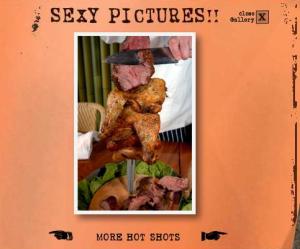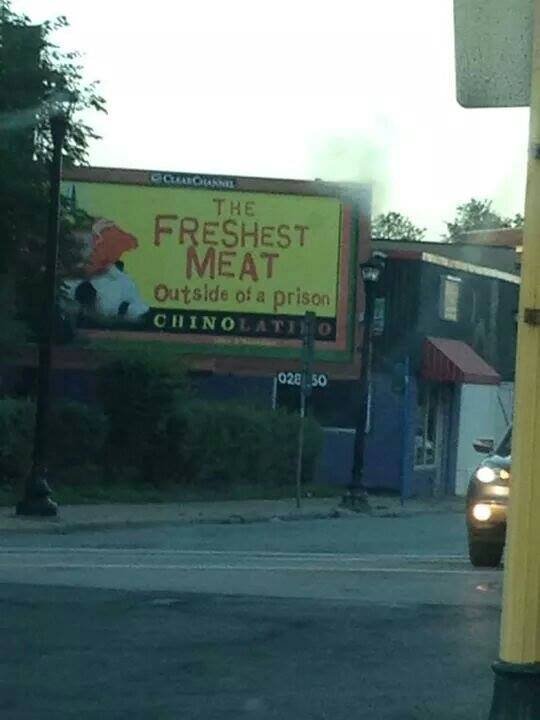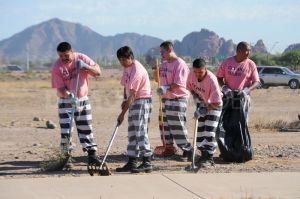The above image was taken on Hennepin Avenue in Minneapolis, Minnesota. The billboard pictured reads, “The Freshest Meat Outside of a Prison,” and advertises a fusion restaurant called Chino Latino. The mocking reference to prison rape is both saddening and telling.
Though we often critique patriarchy in relationship to female disempowerment and violence against women, it is also true that the rape culture evidenced in advertisements like that of Chino Latino celebrate male violence in ways that hurt vulnerable men as well. Rates of rape in the prison system (an institution that targets primarily men) are astronomically high. Victimization is tied to severe emotional trauma, but also increased exposure to disease given the closed nature of the institution. Gay men and transgender persons are extremely vulnerable to assault, but all men are at high risk within the hyper-masculinized and violent environment of the prison system.
Prison rape is a feminist issue for several reasons. First, male-on-male rape is a product of patriarchy and normalized male entitlement to vulnerable bodies. Second, prisoners are, in many ways, feminized bodies. That is, they are disempowered persons who have been stripped of their agency and identity. They generally fall into the “feminine” category within society’s masculine/feminine dichotomy. They become deindividualized and are controlled and exploited by a capitalist/patriarchal institution (the privatized prison system is highly lucrative, relying on an inmate work force that is paid in pennies and cannot unionize). Many are mentally ill when arrested or become mentally ill from the incarceration experience. Imprisoned persons are often forcibly medicated. Imprisoned persons are also forced to wear demeaning uniforms meant to deindividualize or humiliate them. Many are kept in solitary confinement to prevent meaningful and healthy social interactions or relationships.
Third, the prison system is notoriously racist and classist, meaning that poor persons and persons of color are disproportionately targeted for imprisonment. Beginning in the 1970s, this trend increased significantly after the end of legalized slavery and the share-cropping system. Previous economic forms of enslavement were simply replaced with the for-profit prison system.
Finally, of course, female prisoners experience high levels of rape as well, particularly from male prison staff. Too often, the experiences of imprisoned persons are written off because these persons are presumed to “get what they deserve.” This ideology, however, ignores the role of systemic oppression, gross violations of human rights, and the intentional targeting of vulnerable groups.
The Chino Latino advertisement makes light of this horrific system and plays on the rape of vulnerable, deindividualized and feminized bodies to sell the body parts of vulnerable, deindividualized and feminized bodies in the form of “meat.” Exploiting and consuming the bodies of those who cannot consent is funny . . . and sexy . . .
The sexual politics of Chino Latino food is unmistakable. On their website, you are invited to look at “sexy pictures” and “hot shots” of their food and drinks. Many of these images display the corpses of Nonhuman Animals in all varieties of dismemberment and display.
 The advertisement for their party room (a webpage entitled, “Explore Our Private Parts – It’s Okay to Stare”) proclaims:
The advertisement for their party room (a webpage entitled, “Explore Our Private Parts – It’s Okay to Stare”) proclaims:
We don’t like to brag, but why be coy? For parties and private events, Chino Latino is unusually well-endowed, with five unique spaces.
One suggested use (there was no mention of any female equivalent, such as a bridal shower):
[ . . . ] have us host a bachelor party the groom won’t remember to regret.
In other words, spaces where “meat” is served and consumed are considered male spaces, and the products are framed as feminized and waiting for male penetration.
The consumption of animal bodies is embedded within the patriarchal language and imagery of sexualized entitlement to and domination over feminized bodies, be they imprisoned persons, women, or other animals. The references to rape and voyeurism denotes the right of persons of privilege to the private and personal spaces of vulnerable persons. They become objects of resource and enjoyment; their individual agency is obscured and ignored.
The institutionalized and epidemic levels of violence, rape, and death imposed on imprisoned persons (primarily poor persons and persons of color charged with drug offenses), women, and Nonhuman Animals is neither funny nor sexy. That a billboard like this could be posted at all indicates how ingrained rape culture and patriarchal values have become. The presence of these messages demonstrates how the public space is, by default, the male space, maintaining a rigid gender/class/race/species stratification system.
References to the sexual politics of meat in this essay are based on the work of Carol Adams, author of The Sexual Politics of Meat, The Pornography of Meat, and other vegan feminist titles.


